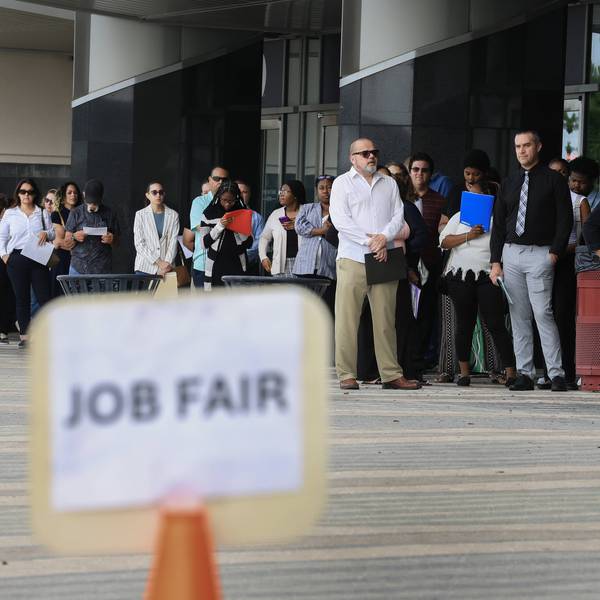The Economy in 2016: On the Edge of Recession
Economic forecasters exist to make astrologers look good, but I'll hazard a guess. I expect the U.S. economy to sputter in 2016. That's because the economy faces a deep structural problem: not enough demand for all the goods and services it's capable of producing.
American consumers account for almost 70 percent of economic activity, but they won't have enough purchasing power in 2016 to keep the economy going on more than two cylinders. Blame widening inequality.
Economic forecasters exist to make astrologers look good, but I'll hazard a guess. I expect the U.S. economy to sputter in 2016. That's because the economy faces a deep structural problem: not enough demand for all the goods and services it's capable of producing.
American consumers account for almost 70 percent of economic activity, but they won't have enough purchasing power in 2016 to keep the economy going on more than two cylinders. Blame widening inequality.
Consider: The median wage is 4 percent below what it was in 2000, adjusted for inflation. The median wage of young people, even those with college degrees, is also dropping, adjusted for inflation. That means a continued slowdown in the rate of family formation--more young people living at home and deferring marriage and children - and less demand for goods and services.
At the same time, the labor participation rate--the percentage of Americans of working age who have jobs--remains near a 40-year low.
The giant boomer generation won't and can't take up the slack. Boomers haven't saved nearly enough for retirement, so they're being forced to cut back expenditures.
Exports won't make up for this deficiency in demand. To the contrary, Europe remains in or close to recession, China's growth is slowing dramatically, Japan is still on its back, and most developing countries are in the doldrums.
Business investment won't save the day, either. Without enough customers, businesses won't step up investment. Add in uncertainties about the future--including who will become president, the makeup of the next Congress, the Middle East, and even the possibilities of domestic terrorism--and I wouldn't be surprised if business investment declined in 2016.
I'd feel more optimistic if I thought government was ready to spring into action to stimulate demand, but the opposite is true. The Federal Reserve has started to raise interest rates--spooked by an inflationary ghost that shows no sign of appearing. And Congress, notwithstanding its end-of-year tax-cutting binge, is still in the thralls of austerity economics.
Chances are, therefore, the next president will inherit an economy teetering on the edge of recession.
This post also appeared on Politico today.
An Urgent Message From Our Co-Founder
Dear Common Dreams reader, The U.S. is on a fast track to authoritarianism like nothing I've ever seen. Meanwhile, corporate news outlets are utterly capitulating to Trump, twisting their coverage to avoid drawing his ire while lining up to stuff cash in his pockets. That's why I believe that Common Dreams is doing the best and most consequential reporting that we've ever done. Our small but mighty team is a progressive reporting powerhouse, covering the news every day that the corporate media never will. Our mission has always been simple: To inform. To inspire. And to ignite change for the common good. Now here's the key piece that I want all our readers to understand: None of this would be possible without your financial support. That's not just some fundraising cliche. It's the absolute and literal truth. We don't accept corporate advertising and never will. We don't have a paywall because we don't think people should be blocked from critical news based on their ability to pay. Everything we do is funded by the donations of readers like you. Will you donate now to help power the nonprofit, independent reporting of Common Dreams? Thank you for being a vital member of our community. Together, we can keep independent journalism alive when it’s needed most. - Craig Brown, Co-founder |
Economic forecasters exist to make astrologers look good, but I'll hazard a guess. I expect the U.S. economy to sputter in 2016. That's because the economy faces a deep structural problem: not enough demand for all the goods and services it's capable of producing.
American consumers account for almost 70 percent of economic activity, but they won't have enough purchasing power in 2016 to keep the economy going on more than two cylinders. Blame widening inequality.
Consider: The median wage is 4 percent below what it was in 2000, adjusted for inflation. The median wage of young people, even those with college degrees, is also dropping, adjusted for inflation. That means a continued slowdown in the rate of family formation--more young people living at home and deferring marriage and children - and less demand for goods and services.
At the same time, the labor participation rate--the percentage of Americans of working age who have jobs--remains near a 40-year low.
The giant boomer generation won't and can't take up the slack. Boomers haven't saved nearly enough for retirement, so they're being forced to cut back expenditures.
Exports won't make up for this deficiency in demand. To the contrary, Europe remains in or close to recession, China's growth is slowing dramatically, Japan is still on its back, and most developing countries are in the doldrums.
Business investment won't save the day, either. Without enough customers, businesses won't step up investment. Add in uncertainties about the future--including who will become president, the makeup of the next Congress, the Middle East, and even the possibilities of domestic terrorism--and I wouldn't be surprised if business investment declined in 2016.
I'd feel more optimistic if I thought government was ready to spring into action to stimulate demand, but the opposite is true. The Federal Reserve has started to raise interest rates--spooked by an inflationary ghost that shows no sign of appearing. And Congress, notwithstanding its end-of-year tax-cutting binge, is still in the thralls of austerity economics.
Chances are, therefore, the next president will inherit an economy teetering on the edge of recession.
This post also appeared on Politico today.
Economic forecasters exist to make astrologers look good, but I'll hazard a guess. I expect the U.S. economy to sputter in 2016. That's because the economy faces a deep structural problem: not enough demand for all the goods and services it's capable of producing.
American consumers account for almost 70 percent of economic activity, but they won't have enough purchasing power in 2016 to keep the economy going on more than two cylinders. Blame widening inequality.
Consider: The median wage is 4 percent below what it was in 2000, adjusted for inflation. The median wage of young people, even those with college degrees, is also dropping, adjusted for inflation. That means a continued slowdown in the rate of family formation--more young people living at home and deferring marriage and children - and less demand for goods and services.
At the same time, the labor participation rate--the percentage of Americans of working age who have jobs--remains near a 40-year low.
The giant boomer generation won't and can't take up the slack. Boomers haven't saved nearly enough for retirement, so they're being forced to cut back expenditures.
Exports won't make up for this deficiency in demand. To the contrary, Europe remains in or close to recession, China's growth is slowing dramatically, Japan is still on its back, and most developing countries are in the doldrums.
Business investment won't save the day, either. Without enough customers, businesses won't step up investment. Add in uncertainties about the future--including who will become president, the makeup of the next Congress, the Middle East, and even the possibilities of domestic terrorism--and I wouldn't be surprised if business investment declined in 2016.
I'd feel more optimistic if I thought government was ready to spring into action to stimulate demand, but the opposite is true. The Federal Reserve has started to raise interest rates--spooked by an inflationary ghost that shows no sign of appearing. And Congress, notwithstanding its end-of-year tax-cutting binge, is still in the thralls of austerity economics.
Chances are, therefore, the next president will inherit an economy teetering on the edge of recession.
This post also appeared on Politico today.

